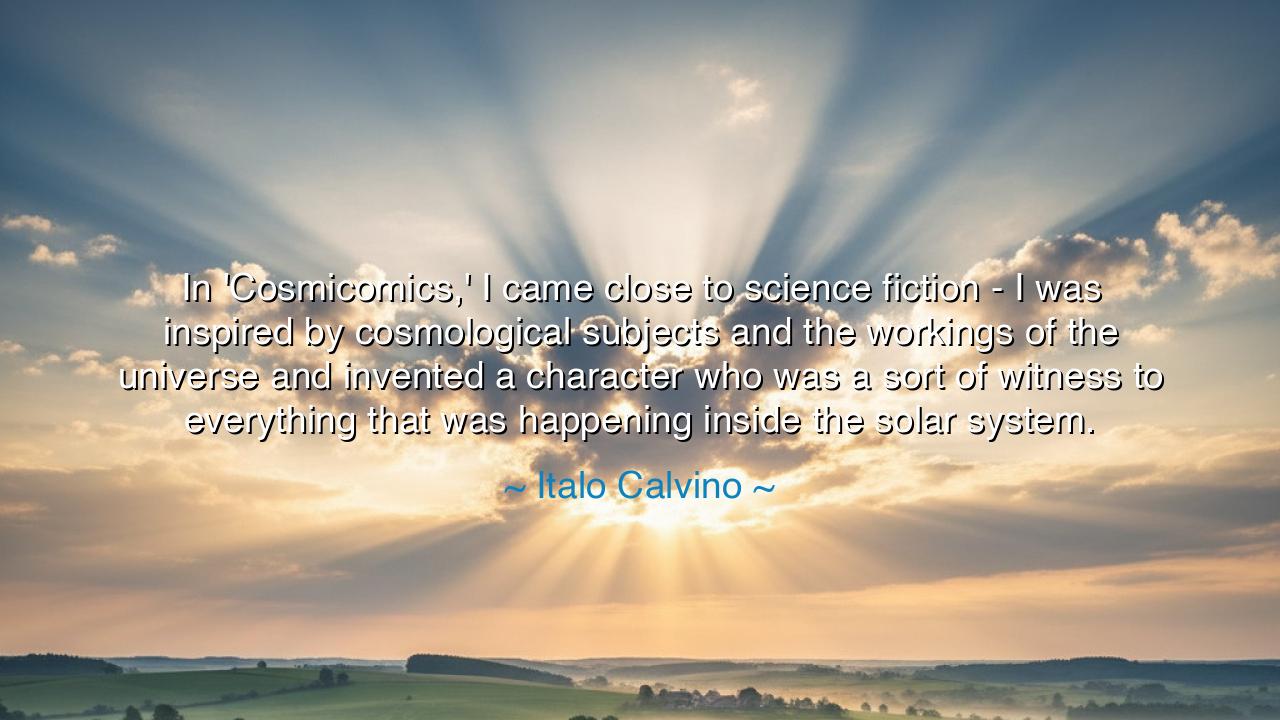
In 'Cosmicomics,' I came close to science fiction - I was
In 'Cosmicomics,' I came close to science fiction - I was inspired by cosmological subjects and the workings of the universe and invented a character who was a sort of witness to everything that was happening inside the solar system.






Hear, O Seekers of Truth, the words of Italo Calvino, a master storyteller who, through the art of fiction, brought us closer to the mysteries of the cosmos. "In 'Cosmicomics,' I came close to science fiction - I was inspired by cosmological subjects and the workings of the universe and invented a character who was a sort of witness to everything that was happening inside the solar system." In these words, Calvino speaks to the mystery of the universe, to the deep and eternal questions that have occupied the hearts of humankind since the dawn of time. Through the lens of fiction, he invites us to explore the very workings of the cosmos, not merely as scientific phenomena, but as living, breathing stories waiting to be told. His character, a witness to the vast expanse of the solar system, embodies our collective yearning to understand the greatness of the universe and our place within it.
Consider, O Seekers, the ancient sages who sought to comprehend the universe through the lens of their time. Pythagoras, that visionary of ancient Greece, believed that the universe itself was governed by numbers, that everything, from the celestial bodies to the harmony of music, was woven together by the mathematical ratios that formed the fabric of existence. His disciples looked to the heavens with wonder, seeking the order behind the stars and the moon. Aristotle, too, contemplated the nature of the cosmos, pondering the nature of the stars, the planets, and the heavens themselves. For these early thinkers, the universe was not a distant abstraction but an active force that shaped every aspect of life on Earth. They too, like Calvino, sought to witness and understand the grand dance of the celestial bodies.
Calvino’s work in Cosmicomics calls us to engage with the cosmic not as a distant, sterile subject, but as a realm filled with story and imagination. By blending science with fiction, Calvino brings the wonders of the universe into the realm of the human experience. The character he creates is not a mere observer but a witness—a living being who feels and experiences the vastness of the solar system as we might feel the wind upon our face or the heartbeat in our chest. It is through such stories that the invisible becomes tangible, that the abstract becomes real. In this, Calvino teaches us that science and imagination are not opposing forces, but companions on the journey to understanding the unknown.
Let us consider the journey of Galileo Galilei, a man who, through the simple lens of a telescope, became a witness to the great cosmic show above. Galileo, like the characters in Calvino’s tales, was not merely an observer; he was a participant in the unfolding story of the universe. When he first looked through his telescope, the moons of Jupiter revealed themselves to him, and he witnessed the motion of the planets in ways that had never been seen before. Just as Calvino’s character is a witness to the workings of the solar system, so too did Galileo become a witness to the deeper truths of the heavens. His discoveries changed the course of history, and through them, the human understanding of our place in the universe was forever altered. Galileo’s story, like Calvino’s, demonstrates the power of observation and the role of the witness in bringing the mysteries of the universe to life.
Calvino’s choice to bring the cosmic to life through fiction is a reminder that science and art are not separate, but two threads woven into the same tapestry. In the same way that the ancient storytellers used myth to make sense of the world around them, so too does Calvino use fiction to explore the depths of science. The stars, the planets, the very laws of physics—these are not just subjects for academics to study in isolation. They are the stuff of stories, the very material that makes up the tales of our existence. In Calvino's work, we are invited to see the cosmos not as a collection of distant facts, but as a living story that unfolds with every new discovery and every new insight.
The lesson, O Seekers, is this: science is not a cold, detached pursuit; it is the exploration of the greatest mysteries of existence. The universe is not just a collection of facts and figures, but a vast and intricate story waiting to be told. Imagination and science are not separate pursuits, but two halves of the same quest for truth. Just as Calvino’s character is a witness to the unfolding story of the solar system, so too are we all witnesses to the unfolding story of the universe. Every discovery, every observation, every piece of knowledge is another chapter in this grand, ever-expanding tale.
So, go forth, O Seekers, with the understanding that science is not just a matter of observation, but of storytelling. Whether you are looking to the stars, studying the smallest particles of life, or seeking to understand the forces of nature, remember that you are not merely observing—you are participating in a grand narrative that has been unfolding for eons. Let your work, whether in science or art, be a part of this story, and may you find the same wonder in the cosmic tale as Calvino did, weaving your own story into the vast web of knowledge that binds us all.






AAdministratorAdministrator
Welcome, honored guests. Please leave a comment, we will respond soon